Prickly -ically
 The adverbial ending -ically can be awkward to handle: in general, we have to remember to write the -al- in the middle, but not to pronounce it.
The adverbial ending -ically can be awkward to handle: in general, we have to remember to write the -al- in the middle, but not to pronounce it.
English has hundreds of adjectives ending -ic. The most common include artistic, athletic, authentic, basic, classic, cosmetic, domestic, dramatic, dynamic, economic, electric, electronic, exotic, fantastic, historic, Islamic, optimistic, organic, public, realistic, romantic, scientific, specific, static, systematic, toxic, tragic.
English also has a smaller but substantial number of adjectives ending -ical. The most common include anatomical, biological, classical, critical, economical, electrical, historical, identical, medical, musical, physical, political, practical, psychological, radical, technical, topical, tropical, typical.
(There are quite a few pairs, eg classic and classical, economic and economical, historic and historical, with somewhat different meanings or uses.)
In writing, the general rule is that both sets are turned into adverbs ending -ically (though there’s one major exception: publicly). In pronunciation, however, these are all generally treated as if they were -icly. Here are native speakers (mainly British) saying basically, typically, historically and systematically:
Of course, native speakers tend to write the way they speak, so they often leave out the -al- in writing. On the site Tripadvisor, this review has the headline “Basicly the cheapest place to stay”, and this review describes a guesthouse as “historicly interesting”. Non-natives, on the other hand, tend to speak the way they write, so they often pronounce the -al- in -ically, thereby making themselves sound foreign.
Some dictionaries tell you that it’s equally possible to pronounce -ically as /ɪkəli/, but in fact this is quite rare: learners and users who want to sound native should avoid the /ə/.
Thee you
 I’ve been lucky enough to teach across Europe, and one phrase which I hear a lot, sometimes to my confusion, is thee you:
I’ve been lucky enough to teach across Europe, and one phrase which I hear a lot, sometimes to my confusion, is thee you:
At least, thee you is what it sounds like, or sometimes the you. The intended phrase, however, is not two syllables but three: the E.U.
What’s going on here is the blurring together of the two syllables the and E. Speakers from various language backgrounds often pronounce the as ði and E as i, so the phrase becomes ðiiju or just ðiju.
In native English, this kind of pronunciation is only possible in very rapid speech. In less rapid speech, the division between the and E can be heard either as a ‘glottal stop’ (a catch in the larynx, symbol ʔ) or as a j sound (like in the middle of beyond). Here are natives saying the E.U. with a glottal stop between the and E:
If a glottal separation isn’t used, the will generally be linked to a following vowel by a j sound. This j is not an addition, but part of the first vowel: ðɪj or ðij. The most common type of dictionary transcription doesn’t show the j, but it’s been noted at least since Henry Sweet’s Primer of Spoken English of 1890, which writes the vowel as ij. Here are natives saying the E.U. with the first two syllables connected, and separated, by j:
By contrast, here are some non-native ‘thee you’ pronunciations: 1. thee you is not interested in granting aid; 2. we are very close to thee you; 3. the third one is obviously thee you funds; 4. the former minister of thee you.
(Another issue is the English letter names. If these end in a vowel, it must be a long vowel, because English words never end in stressed short vowels. Very many non-natives pronounce E and U too short.)
You may be interested in these related articles in my Speech Talk blog:
It wasn’t acceptable in the 80s
Seeing the FLEECE diphthong
House of chaos
 This week I’m in Rīga to teach at the University of Latvia; very near my hotel is a restaurant whose name carries an important lesson for most learners and non-native users of English.
This week I’m in Rīga to teach at the University of Latvia; very near my hotel is a restaurant whose name carries an important lesson for most learners and non-native users of English.
Visitors from around the world will recognize that Steiku Haoss is a steak house. But most native English speakers probably won’t recognize that the name is a pun: haoss is the Latvian form of the word chaos, so the restaurant is also a ‘chaos of steaks’. Here’s a Latvian kindly saying it for me:
The English pronunciation of chaos is different from that in most languages. As a result of the historical English ‘Great Vowel Shift’, the five vowel letters of the Roman alphabet are often pronounced like their English names: A, E, I, O, U. For example mosaic, being, compliant, oasis, ambiguity – and chaos. Here are various British speakers saying chaos (the first is Prime Minister David Cameron):
This might be transcribed phonetically as kɛ́jɔs (or ˈkeɪɒs). It’s very different from the kind of pronunciation used by almost every other European language, including Latvian. (Different languages pronounce the initial consonant of such Greek words variously as k, h or the back-of-the-mouth fricative x.)
The important point for learners and non-native users of English, I feel, is that you should try to give international words the pronunciation appropriate to the language you’re speaking. Many non-native users of English, however, fall back on their own pronunciation of words like focus and chaos, resulting in what sounds to English speakers more like f*ck us and house (or perhaps cows). Of course, if non-natives are speaking to each other, the problem may be less.
Related post: Meet the Fockus
(Apparently there’s a Russian death metal band whose name uses the same pun.)
The artist formerly known as prints
 A headline on the BBC website this week exploits the similarity of the two words patients and patience:
A headline on the BBC website this week exploits the similarity of the two words patients and patience: For many speakers these words are not merely similar but identical, thanks to the insertion (‘epenthesis’ is the fancy word) of a t between the sounds n and s in words like patience.
For many speakers these words are not merely similar but identical, thanks to the insertion (‘epenthesis’ is the fancy word) of a t between the sounds n and s in words like patience.
This is quite a natural thing. Going from n to s requires the speech organs to do three independent things simultaneously: switch from nasal to oral airflow, turn off vocal cord vibration, and release the contact between the tongue and the roof of the mouth. If the third of these things happens a bit late, the result is a brief t.
We recently had a higher-profile opportunity to hear this with the death of the superstar Prince. Here’s one BBC newsreader, Clive Myrie, saying Prince with no added t:
And here’s another BBC newsreader, Rebecca Jones, adding t so that the name sounds the same as prints:
I think I myself quite often do t-epenthesis to some degree, but for some speakers it’s categorical, so their words never contain n followed directly by s. This means that the contrast between various pairs of words is lost. Aside from prince-prints, common ones are mince-mints, sense-cents, dense-dents, tense-tents and chance-chants.
A larger group of pairs have the unstressed endings -ence/-ance and -ents/-ants, all of which are pronounced with the weak colourless vowel ə (or no vowel at all). So we have patience-patients, adolescence-adolescents, attendance-attendants, and a few dozen others.
Context will usually make the meaning clear, especially as there’s generally a grammatical difference. But the next time someone asks if you’d like some mɪnts, you might want to check whether they mean mints or mince.
First class box sets
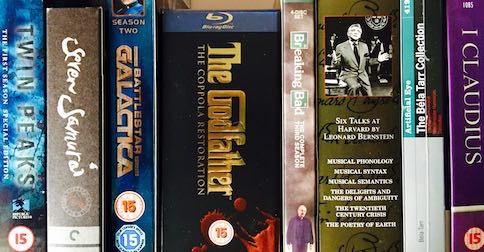 English has a verb to box, meaning ‘to put in a box’. A set of things which has been put in a box is therefore a boxed set.
English has a verb to box, meaning ‘to put in a box’. A set of things which has been put in a box is therefore a boxed set.
Obviously sets of things have been put in boxes for a long time, but the concept has grown in recent decades, with the boxing of paperbacks, records, audiocassettes, videotapes, CDs, DVDs and Blu-ray Discs, and has been boosted further by the rise of the multi-season TV saga. Now such sets can be accessed in e-formats with no physical box at all.
The phrase boxed set, if carefully pronounced, contains a tricky consonant sequence: bo/ksts/et. Fortunately, English allows the omission of /t/ (and /d/) under certain circumstances. One of these circumstances is when one word ends /st/ and the next starts in a consonant. This gives us the perfectly standard option in spoken English of firs’ class, firs’ pas’ the post, las’ word, jus’ kidding, etc etc. (A frozen historical example is Chris’mas.)
It also gives us box’ set. This in turn can be interpreted as a compound noun – the noun box compounded with the noun set – rather than the noun set modified by the participle boxed. The British, in fact, have taken to writing the term as a compound, box set, something which Americans seem to have resisted.
This Google Ngram of occurrences in books suggests that the British developed a mania for boxed sets in the 1970s, with the Americans starting to catch up a few years later. British enthusiasm fell somewhat, to American levels, and then in the 1990s the Brits experienced a new craze for the compound box set, apparently unshared in the US:
Accordingly, the American site Amazon.com has a category Boxed Sets, while Britain’s Amazon.co.uk has Box Sets:
 In pronunciation, neither Brits nor Americans are keen on pronouncing a /t/ corresponding to -ed. However, contrary to the written forms, Americans in the recordings I’ve sampled are more likely to put the main stress on the first word (as you’d expect with a compound, like box office), while Brits are somewhat more likely to put the main stress on the second word (as you’d expect with a modifying participle, like boxed wine). Americans:
In pronunciation, neither Brits nor Americans are keen on pronouncing a /t/ corresponding to -ed. However, contrary to the written forms, Americans in the recordings I’ve sampled are more likely to put the main stress on the first word (as you’d expect with a compound, like box office), while Brits are somewhat more likely to put the main stress on the second word (as you’d expect with a modifying participle, like boxed wine). Americans:
Brits:
The only /t/ in those recordings is from the last of the Britons.
Do not blog the aisles
 On a recent flight I was told not to blog the aisles; but recklessly I’m going to blog anyway.
On a recent flight I was told not to blog the aisles; but recklessly I’m going to blog anyway.
Of course the intended phrase was Do not block the aisles. The flight attendant was Polish, though the phonetic phenomenon in question is also characteristic of Russian and other Slavic languages, as well as Dutch. But don’t click away if your mother tongue is different, because the challenge which English presents is one that applies widely, in fact to a clear majority of those I teach.
Pronouncing block‿the as blog‿the is a phenomenon known to specialists as ‘anticipatory voicing assimilation’. The final sound of block anticipates the voicing of the first sound of the. The first sound of the is voiced (has vocal cord vibration); the voiceless k of block assimilates to it, becoming voiced g.
This process affects huge numbers of words and phrases, creating foodball, tegzbook, fazebook, etc. The is the most common word in English, and speakers with native voicing assimilation will tend to voice any sound that precedes it, turning put‿the, got‿the, not‿the, let‿the etc into pud‿the, god‿the, nod‿the, led‿the etc.
One of the things that makes English so tricky is its large number of contrasting consonants in final position. The majority of those I teach find this challenging. For example:
In other words, pay attention to the final consonants of English, and practise the difference between
and
If you don’t read this, you won’t get these words right
 Two very common words which non-natives rarely pronounce like natives are don’t and won’t.
Two very common words which non-natives rarely pronounce like natives are don’t and won’t.
These two words contain the GOAT vowel, as in dough and woe. The GOAT vowel is a diphthong in the standard accents of America and England. This means it has a changing quality, as shown in the usual dictionary transcriptions: /oʊ/ for AmE, /əʊ/ for BrE. The transcriptions /ou, əu/ and /ow, əw/ are also possible.
But non-natives tend to pronounce these words with a short o, which is exactly what you’d expect from the majority of words written with ont: context, continent, font, horizontal, Monty, onto, pontiff, spontaneous, Toronto, Vermont, etc, etc.
Non-natives can be forgiven for finding the native pronunciation tricky. For one thing, it’s not at all common to find English words with the GOAT diphthong followed by /nt/. In fact, don’t and won’t are the only words in common use which have this sequence. (See further notes below.)
For another thing, non-natives will often hear native speakers reducing these words in running speech. The super-common sequence don’t know is so often shrunk in casual speech that there’s even a spelling for it, dunno.
There’s an issue here of style: non-natives tend to use short or reduced pronunciations of don’t and won’t even in the kind of fairly careful speech where natives would use stronger pronunciations.
Here then are some examples of don’t pronounced clearly in natural native speech. Note that it’s very common for the /t/ to be pronounced as a glottal stop – a silent gap with the breath briefly stopped in the throat – but this is not the same thing as omitting the /t/ altogether.
And some examples of won’t:
Further notes
Another word traditionally pronounced in BrE just like won’t is wont, meaning ‘custom’ or ‘accustomed’. However it’s now quite rare. This Google Ngram indicates its occurrence in books:
We still sometimes encounter the expressions ‘as was their wont’ (= their custom) or ‘as they were wont to do’ (= accustomed to do). I think today wont may alternatively be pronounced with the short LOT vowel, so that it sounds like want rather than won’t.
A super-common ont word which is pronounced neither with GOAT nor with LOT is front. This has the STRUT vowel, as in blunt.
Indecisive divisive
 On Monday US President Obama commented on the campaign to select the Republican Party’s nominee for the November general election. He complained about its divisive rhetoric, pronouncing divisive with the lax vowel ɪ in its stressed middle syllable (4:54):
On Monday US President Obama commented on the campaign to select the Republican Party’s nominee for the November general election. He complained about its divisive rhetoric, pronouncing divisive with the lax vowel ɪ in its stressed middle syllable (4:54):
This is a pronunciation he’s quite well known for in America; thanks to the high profile of the Republican campaign, it may be reaching some international ears for the first time.
It’s a rather irregular pronunciation. There are only four or five words in general use whose spellings end -isive: decisive, derisive, divisive, incisive and indecisive. Setting aside the Obama pronunciation, all of these have the ‘long i’ of PRICE, as the CUBE dictionary shows (the symbol # searches for the edge of a word):
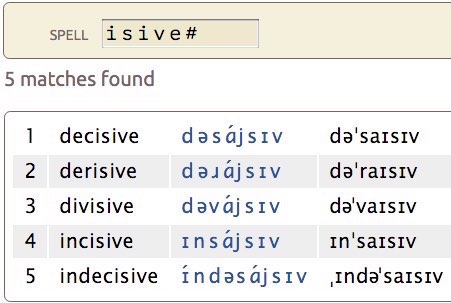 The ‘Obama pronunciation’ of divisive aligns it with words spelled -issive, of which the three most common by far are dismissive, permissive and submissive. Here they are in CUBE, with internet frequency counts:
The ‘Obama pronunciation’ of divisive aligns it with words spelled -issive, of which the three most common by far are dismissive, permissive and submissive. Here they are in CUBE, with internet frequency counts:
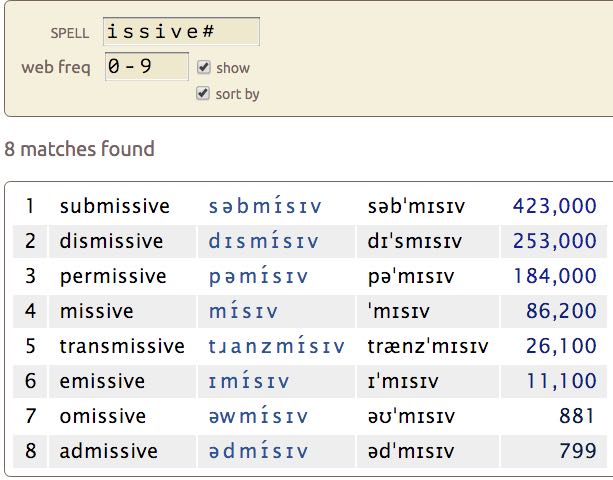 Divisive with ɪ may have come about by analogy with division. All words whose spelling ends -ision have the lax ɪ vowel. The most common:
Divisive with ɪ may have come about by analogy with division. All words whose spelling ends -ision have the lax ɪ vowel. The most common: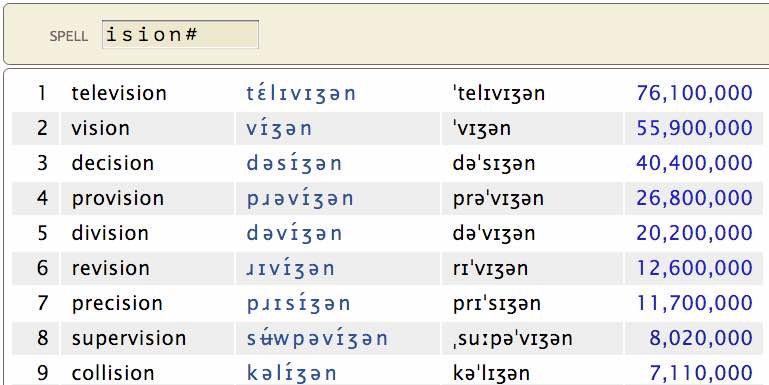 I can’t recall hearing divisive with ɪ in the UK, but in the US it’s certainly not restricted to the President. A search on Youglish.com reveals a fair number of other speakers using it (and a few pronouncing the s as z):
I can’t recall hearing divisive with ɪ in the UK, but in the US it’s certainly not restricted to the President. A search on Youglish.com reveals a fair number of other speakers using it (and a few pronouncing the s as z):
But occurrences with the long PRICE vowel outnumber them about three to one:
Even President Obama has been heard to use this majority pronunciation, as Ben Yagoda has pointed out. But the boost he’s given to divisive with ɪ has made some people rather… indecisive (40:35):
How mayor may or may not be pronounced
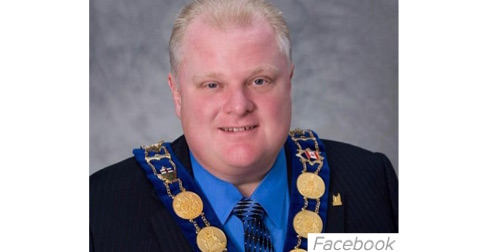 Mayors seem to have been much in the news this week, often under tragic circumstances. An Iraqi village mayor, Ahmed Shaker, was one of over 40 people killed in a suicide bombing after a football match near Iskandariya (Alexandria). Mayor Mayeur of Brussels has been speaking out since the bombings there that claimed over 30 lives. And troubled Toronto mayor Rob Ford (pictured) succumbed to a rare liposarcoma diagnosed in 2014.
Mayors seem to have been much in the news this week, often under tragic circumstances. An Iraqi village mayor, Ahmed Shaker, was one of over 40 people killed in a suicide bombing after a football match near Iskandariya (Alexandria). Mayor Mayeur of Brussels has been speaking out since the bombings there that claimed over 30 lives. And troubled Toronto mayor Rob Ford (pictured) succumbed to a rare liposarcoma diagnosed in 2014.
All my life I’ve pronounced mayor exactly like mare (‘female horse’), with a single long vowel, mɛː. This is probably the most common pronunciation from British TV news people. Here it is from the long-time presenter of BBC TV’s Newsnight, Jeremy Paxman:
This pronunciation can be heard in the audio clips of various dictionaries:
But another pronunciation is increasingly heard. This one has two syllables, mɛ́jə, rhyming with player and Leia:
The 2-syllable pronunciation is especially common with younger speakers, but is not restricted to them. Mayor Nir Barkat there is said by Stephen Sackur, a major figure in BBC news, who is 52. I suspect it’s arisen partly due to the spelling (compare mayonnaise, which begins mɛ́jə), and partly due to the ever-present influence of American English, which usually pronounces mayor with 2 syllables. But it’s unacknowledged as a British pronunciation in the online dictionaries I’ve consulted, and even in the variant-rich LPD.
To redress the imbalance, and because I suspect that the 2-syllable pronunciation will steadily displace mɛː, I’ve opted for the former as the recommended pronunciation in CUBE. Nonetheless, mɛː is still heard from some younger folks, as in BBC Radio 1ʼs Mayor of Where? – /hɪ(ː) kʌ́mz ðə mɛ́ː bət ðə mɛ́ː(r)əv wɛ́ː/:
Increasingly old-fashioned today is a pronunciation with a ‘centring diphthong’, eə or ɛə. Here is an example from a 1932 Pathé newsreel:
In my experience, non-natives who have learned the old transcriptions /eə/ and /eɪə/ (for ɛː words and ɛjə words respectively) are likely to pronounce them very similarly, so that payer pɛ́jə and pair pɛː risk being confused. The following might be either word:
It is in fact from prepare, said by Polish-born language teacher Michel Thomas. This kind of foreign-sounding pronunciation is actively encouraged by the transcription /eə/.
sausage anne egg McMuffin
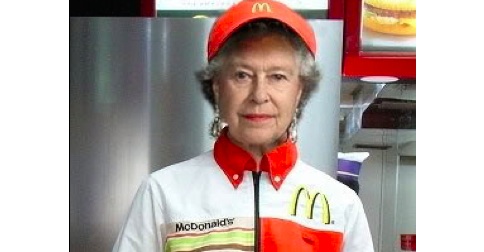 Recently I encountered a poster from fast food chain McDonald’s with the caption ‘sausage anne egg McMuffin’. The Anne in question is a franchisee who operates several McDonald’s restaurants in England.
Recently I encountered a poster from fast food chain McDonald’s with the caption ‘sausage anne egg McMuffin’. The Anne in question is a franchisee who operates several McDonald’s restaurants in England.
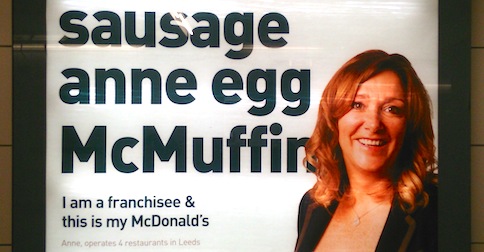 The caption, of course, is a pun on the phrase ‘sausage and egg McMuffin’. It’s a fairly good pun, because the final /d/ of and is usually not pronounced. The pun isn’t perfect, however, because Anne has a strong /a/ vowel, whereas and usually has a weak, colourless schwa, /ə/.
The caption, of course, is a pun on the phrase ‘sausage and egg McMuffin’. It’s a fairly good pun, because the final /d/ of and is usually not pronounced. The pun isn’t perfect, however, because Anne has a strong /a/ vowel, whereas and usually has a weak, colourless schwa, /ə/.
The pronunciation of and as /ən/, or even /n/, is very much the norm when conjoining two words like sausage and egg, or back and forth, country and western, deaf and dumb, fish and chips, give and take, hit and run, neck and neck, rhythm and blues, trial and error, up and coming, Crime and Punishment, Dolce and Gabbana, Jekyll and Hyde, Laurel and Hardy, Pride and Prejudice, Romeo and Juliet, War and Peace, etc, etc:
Pronouncing and as /and/ in such phrases would be quite unusual, or foreign-sounding. But I sometimes struggle to persuade those I teach that this is true. Many seem to be convinced that /an/, /ən/ and /n/ are lazy or non-standard, and that and ‘should’ be pronounced /and/. So I thought it might be worth listening to and in the Queen’s English, literally.
In the Queen’s most recent Christmas message to her subjects, the word and occurs more than a dozen times. Only once is it pronounced /and/:
Twice it keeps the strong /a/ vowel but loses the /d/, making it like Anne:
All the other cases are reduced, somewhat or entirely, to /ən/ or /n/:
By the way, she has a McDonald’s of her own. I can’t say whether its customers include Princess Anne.
The Queen supersizes her property portfolio with a McDonald’s drive-through restaurant
The Queen has bought her own drive-through McDonald’s restaurant, her financial accounts have revealed. Her Majesty purchased a retail park near Windsor Castle, where the branch of the fast food chain is located, this month. The Bath Road Retail Park in Slough, which is visible from the Queen’s quarters in Windsor Castle, was bought by the Crown Estate for £92million.










